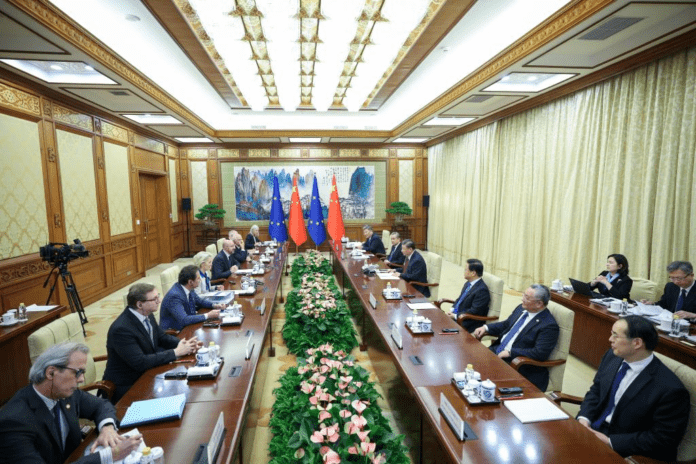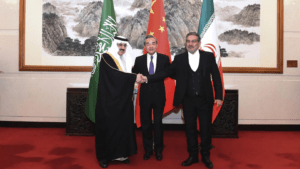
Editor’s note: China’s diplomacy has been in full swing this year after the country resumed exchanges with the world in an orderly manner. Since the start of the year, Chinese President Xi Jinping has been on a tight diplomatic schedule. What is the significance of Xi’s diplomacy? How does it influence the global landscape? Chinese Diplomacy in Action is a five-part series exploring the effectiveness of China’s diplomatic activities in the past year. The first essay is on China’s diplomacy in 2023.
This March, an amazing piece of news shocked the world. Mediated by China, Iran and Saudi Arabia had agreed to restore diplomatic relations and reopen their embassies. UN Secretary-General Antonio Guterres expressed thankfulness for China’s effort. China’s successful mediation in the historic reconciliation indicates the two countries’ recognition and trust in China’s diplomatic policies on the Middle East.
China’s diplomacy upholds the stance of solving conflicts through dialogue. This principle is significant, especially at the moment when the world is witnessing a prolonged Ukraine crisis and a devastating Israel-Palestine conflict, which have resulted in severe humanitarian disasters.
China released paper entitled “China’s Position on the Political Settlement of the Ukraine Crisis” and “Position Paper of the People’s Republic of China on Resolving the Palestinian-Israeli Conflict” in February and November, respectively, this year. Both papers advocate dialogue for peace, emphasizing that the interests of relevant parties should be fully considered on the basis of respecting sovereignty and territorial integrity, and that peace in the region should be restored as soon as possible through negotiations.
China is committed to seeking common ground while setting aside differences, choosing dialogue over confrontation, replacing coercion with consultation, and safeguarding common interests that transcend national boundaries. Examples can be found in the growing trend of regional rapprochement and cooperation in the Middle East, such as the resumption of Qatar-Bahrain diplomatic relations.

Apart from that, China insists on enhancing coordination and mutual trust between major countries or economies, showing the responsibility a major country should shoulder when facing international affairs.
This can be exemplified by China-U.S. relations in 2023. Although there were points of frictions between the two largest economies – mostly in the first half of the year, frequent exchanges in the second half prove that win-win cooperation is the trend of the times.
In particular, the Xi-Biden summit meeting in November, which is not only enhancing mutual trust and bridging differences, but also promoting multilateral cooperation between Beijing and Washington. Just as Chinese President Xi Jinping said, “the world is big enough to accommodate both countries, and one country’s success is an opportunity for the other.”
The other example is the relationship between China and the European Union, which has experienced ups and downs this year, especially when the latter proposed the “de-risking” concept this March. Consequently, the European Commission started an anti-subsidy probe into electric vehicle imports from China.
China expressing concerns for this probe is not that such a measure is fatal; it is that achieving “de-risking” towards China will be a critical hit for the EU’s economy as China remains the leading supplier of goods to the EU.
Under this background, the 24th China-EU Summit held in Beijing on December 7 helps coordinate differences, reaches a broader consensus and strengthens political mutual trust through face-to-face communications between the leaders of the two sides.
Statistics show how important China-EU cooperation is. According to China’s Ministry of Commerce, imports from China to the EU amounted to 626 billion euros ($684.12 billion) in 2022, an increase of 32.1 percent year-on-year. By the end of last year, China had more than 2,800 direct investment companies in Europe, employing more than 270,000 foreign employees.
As Zoltan Kiszelly, director of the Center of Political Analyses at Hungary’s Szazadveg Institute, put it, “cooperation between the EU and China has made these two poles of the world economy one another’s biggest trading partners.” Promoting a healthy development of China-EU relations showcases one of the critical features of China’s diplomacy: well-handling major-countries relations.
Another distinct quality of China’s diplomacy is the proposal of building a community with a shared future for mankind. As Danilo Turk, former president of the Republic of Slovenia, indicated, the concept of a community with a shared future for mankind highlights the importance of working together and advocates that all parties join hands to shape a better future, rather than leaving it at the mercy of fate.
This is clearly illustrated by the China-proposed Belt and Road Initiative (BRI), which aims to facilitate policy coordination, infrastructure connectivity, unimpeded trade, financial integration, and closer people-to-people ties among participating countries.
According to the white paper titled “The Belt and Road Initiative: A Key Pillar of the Global Community of Shared Future,” China has dispatched more than 2,000 agricultural experts and technicians to over 70 countries and regions, and introduced more than 1,500 agricultural technologies and crops to many of these countries, helping reduce rural poverty, develop modern agriculture and increase farming incomes in Asia, Africa, the South Pacific, Latin America and the Caribbean.
China’s diplomacy in 2023 demonstrates that China has always been a supporter of world peace, a contributor to global development, and a defender of the international order. China’s diplomatic practices have become a key factor in promoting the current deadlock in relevant regions and reaching peaceful resolution of the conflict. As Syrian Foreign Minister Faisal Mekdad said, “the international situation has changed significantly and China’s role has become prominent at various levels.”
(Contributed by Sun Zhuangzhi, director of the Institute of Russian, Eastern European and Central Asian Studies at the Chinese Academy of Social Sciences.)
(If you want to contribute and have specific expertise, please contact us at [email protected]. Follow @thouse_opinionson Twitter to discover the latest commentaries in the CGTN Opinion Section.)
The article was first published by CGTN.









